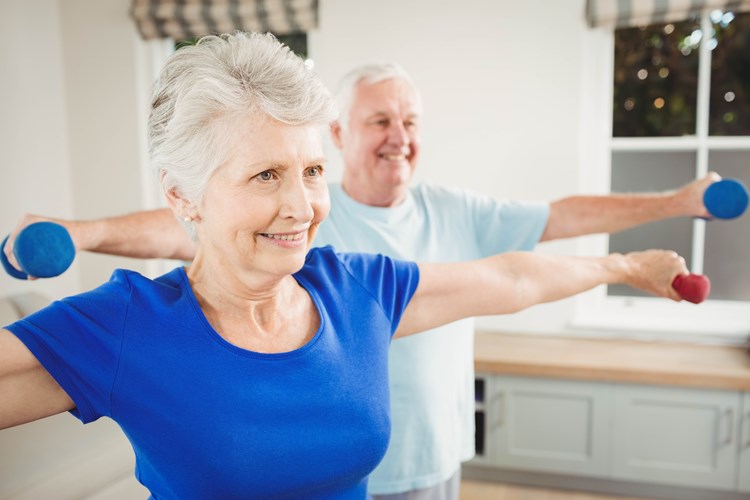The Power of Positivity and Lifestyle Choices
No matter what your age, you have the power to change many of the variables that influence how long you live, and how active and vital you feel in your later years. Actions you can take to increase your odds of a longer and more satisfying life span are really quite simple:
- Don't smoke.
- Enjoy physical and mental activities every day.
- Eat a healthy diet rich in whole grains, vegetables, and fruits, and substitute healthier monounsaturated and polyunsaturated fats for unhealthy saturated fats and trans fats.
- Take a daily multivitamin, and be sure to get enough calcium and vitamin D.
- Maintain a healthy weight and body shape.
- Challenge your mind. Keep learning and trying new activities.
- Build a strong social network.
- Follow preventive care and screening guidelines.
- Floss, brush, and see a dentist regularly.
- Ask your doctor if medication can help you control the potential long-term side effects of chronic conditions such as high blood pressure, osteoporosis, or high cholesterol. Harvard Medical School

Good advice from the medical experts. Changing lifestyle that fails to reflect due regard to one's current and future health requires commitment. We become habituated to many things in life, and to contemplate making these commitments is to acknowledge that we have the potential to vastly improve the state of our health, our satisfaction with life and end up with a longer, more active and healthy lifespan. For people who become accustomed as they age to a sedentary lifespan to determine that in the interests of becoming healthier and living longer they must become more active, that realization may seem burdensome.
For people who have become reliant to eating on the run, and consuming commercial products in favour of whole foods, it becomes a wholesale change in perspective to set aside dependence on processed foods in favour of eating more whole grains, fruits, vegetables, poultry, fish; choosing fresh and unprocessed over nutrition-deficient and calorie-dense foods. And then there is also the issue of being involved in life, using our brains to pursue new avenues of interest to keep our minds malleable and involved.

It can be done, and often the living proof is those in society who are now in their 70s and 80s who live fulfilling lives not only because their DNA has endowed them with good genes, but because their lifestyles have always been practical in outlook and dedicated to pursuing an ongoing status of robust health. They engage in brain exercises, reading and informing themselves, they expend energy in the physical exercises of their choice be it swimming, sports, hiking, bicycling, dancing; whatever.
And they make certain they have adequate daily rest, because sleep and sound sleep patterns resulting in adequate hours of sleep -- an average of at least 7 hours nightly -- is a basic requirement to achieving and maintaining good mental and physical health. Maintaining balanced blood sugar and good muscle mass result from balanced energy levels, all aids in preserving gut and immune health for an enjoyable and long life.

The brain requires Omega-3 fatty acids to function optimally, to reduce inflammation and build and repair cell membranes, all of which help in managing stress, protecting against diabetes onset and cardiovascular conditions. Good sources of Omega-3 are salmon, sardines, mackerel, flaxseed, chia seeds, canola oil, walnuts and soybeans, among others, readily incorporated into a healthy, diverse diet. We also need to hydrate our brain to prevent brain cells from dehydrating resulting in headaches, constipation, muddled thoughts.
With age, the absorption of nutrients in the gut becomes more difficult; drinking ample water helps the gut to remain healthier. Cognitive function is improved with B vitamins. B vitamins also help in the absorption of nutrients with an age-related decrease in stomach acidity. Medications can also block the ability of the body to absorb B vitamins, just as stress can. B vitamins are found in eggs, beans, nuts, seeds, green vegetables, fish and whole grains. As well as red meat, broccoli, spinach, oranges, avocados, bananas, and more.
As we age, lean body mass is lost, continuing with advanced age. Fat mass increases as muscle mass decreases, which can lead to chronic conditions like diabetes and heart disease. Lose enough muscle mass and chances of falling increase; with age bone mass decreases as well with the potential to lead to osteoporosis. Ensuring sufficient protein is consumed from beans, nuts, seeds, fish, chicken is vital as the body ages. This is where moderate weight-bearing exercise and yoga can help with muscle strength and body flexibility.
Nuts and seeds provide Vitamin E, a beneficial antioxidant supporting immune function, along with Vitamin C, when we consume citrus fruits, berries, leafy greens and tomatoes. Coloured fruits and vegetables provide boosts to the immune system as well. The daily addition of Vitamin D is advised since as we age, deficiency in that critical vitamin occurs. We absorb Vitamin D through exposure to the sun, and levels decrease markedly through the winter months. This is a vitamin that supports the immune system, prevents cancer and adds to bone and heart health.
Last, but certainly not least, is the attitude we bring to life. Appreciating the life we have and the way we lead it; feeling positive thoughts gives a boost to good health. Many scientific studies have pointed to a healthy emotional state being instrumental in aiding people to overcome serious health problems. A research team at the Israel Institute of Technology several weeks back published a paper in the science journal Nature Communications when they discovered a connection between emotional state and the body's capacity to combat cancer.
 |
| How Seniors Can Benefit from Adopting an Exercise Regimen - AgingCare.com |
Labels: Aging, Bioscience, Exercise, Food, Health, Sleep Deprivation


0 Comments:
Post a Comment
<< Home